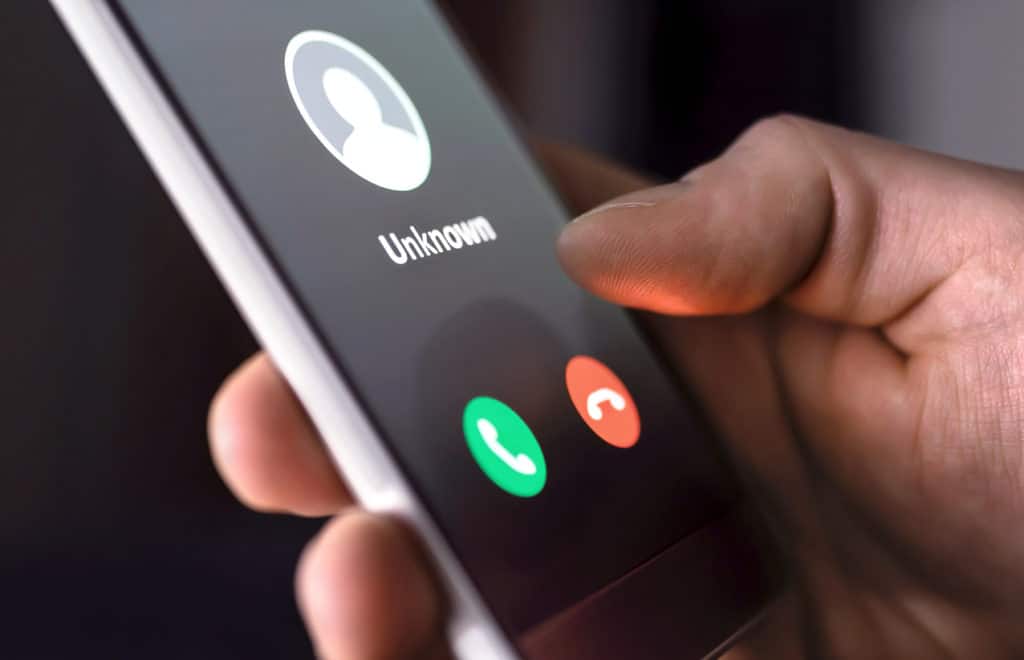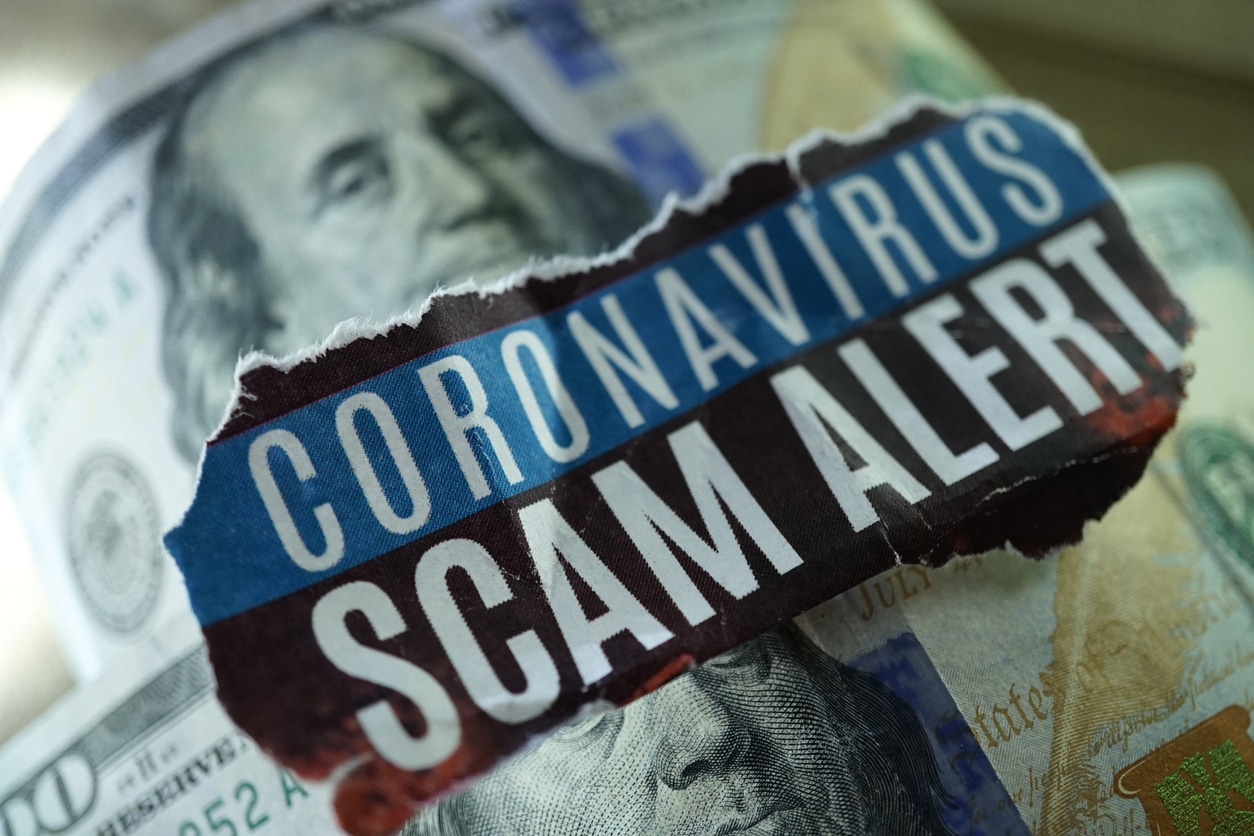Panic can bring out the best and the worst of us. While feel-good stories are being shared about people helping their neighbors during the coronavirus (COVID-19) crisis, some bad actors are preying upon fears with scams and frauds.
Certain individuals and companies are using this opportunity to take advantage for their own financial gain. Read on to learn more about these scams and what you can do to protect yourself.
10 common coronavirus scams to watch out for
These schemes run the gamut. Some are designed to steal your personal information, while others are made to swindle you out of money. Here are 10 coronavirus scams currently making the rounds.
1) Fake coronavirus tests
The New York Police Department Crime Prevention Division recently tweeted: “Be aware that @CDCgov is absolutely NOT going door to door to check on people or offer virus testing. It’s a scam.”
How it works: People are getting robocalls and emails inviting them to sign up for fake tests. Con artists are also going door-to-door selling the tests, while others have created websites selling them online.
What to do: The FDA has not yet authorized any at-home COVID-19 test kits. Ignore calls or online offers promising COVID-19 tests. If you’ve been contacted about a fake test you can report the fraud here.
2) Bogus Social Security letters
Many Social Security offices have temporarily closed due to COVID-19, a situation scammers are using to send fake letters to recipients threatening to suspend their benefits.
How it works: Fake letters sent to Social Security beneficiaries direct them to call a phone number or visit a website and provide personal information. Payment is demanded via wire transfers, gift cards, or by mail in order to stop suspension of benefits.
What to do: The Social Security Administration will not suspend or discontinue benefits due to office closures. If you receive one of these fake letters, do not respond. Instead, report the fraud here.
3) Scam coronavirus treatments
There are currently no FDA-approved vaccines or drugs available to treat coronavirus, but that hasn’t stopped companies from promoting phony treatments.
How it works: Fake treatments are being promoted through letters and online. Unsuspecting victims looking for a cure click on links and call phone numbers designed to scam them out of personal information and money.
What to do: Recently, the Federal Trade Commission (FTC) and the FDA issued cease-and-desist letters to companies promoting federally unapproved or misbranded treatments. If you have questions about coronavirus treatments, contact your doctor. And if you’re aware of such fraud, report it to the FDA.

4) Government check scams
The FBI and other agencies are warning Americans to beware of phone calls, emails, or texts requesting financial or personal information in order to qualify for a federal coronavirus stimulus check.
How it works: Scammers are sending out official-looking letters and emails demanding bank account details and computer login information in exchange for government stimulus checks.
What to do: From the IRS: “You don’t need to call or sign up for anything. The IRS will post information on stimulus checks as soon as it’s available.” If you’ve been a victim of a coronavirus check scam you can report it to the FBI. Learn more about stimulus measures that the government recently passed here.
5) Fake GoFundMe pages
As thousands of people are diagnosed with COVID-19 and are unable to work, many are finding it hard to make ends meet and are asking for donations. At the same time, scammers are creating fake GoFundMe pages designed to tug at your heartstrings and empty your wallet.
How it works: Phony GoFundMe pages are shared on social media and through email. Some contain photos and names of real people to make their pages look legitimate. Unsuspecting contributors click on these links and end up losing money never intended for COVID-19 victims.
What to do: Be wary of individuals seeking coronavirus donations. If a friend sends you a link, verify it before donating. You can report a fake campaign or page to GoFundMe.
6) Price gouging
The coronavirus pandemic has created panic buying of items such as hand sanitizer and toilet paper. Crooks are seizing the opportunity to sell products at astronomical rates.
How it works: Products like toilet paper are selling for as high as $100 on eBay, while similar price gouging is happening on Amazon and in stores. People desperate for supplies are paying the prices, but the practice is illegal.
What to do: To report cases of price gouging, contact your state’s government offices or visit this website.

7) Work-at-home schemes
COVID-19 work-at-home schemes promising jobs to financially-strapped individuals are appearing across the U.S.
How it works: Scammers are posting fake work-at-home jobs related to the coronavirus online. Some ask for credit card information and other personal details in exchange for a job.
What to do: Don’t click on any unknown coronavirus-related link or email offering jobs. Instead, report the scam to your state’s attorney general’s office or the FTC.
8) Coronavirus charity scams
Although it’s tempting to donate to various charities claiming to help coronavirus victims, don’t fall for bogus requests.
How it works: Fake charity scams, shared on social media, are requesting donations to help victims. The donations go to scammers, though.
What to do: If you see a charity request containing misspelled words, bad grammar, or demands for banking information, steer clear. Only donate to charities you know and trust.
9) Coronavirus ransomware
The FTC is warning people to beware of suspicious emails and links claiming to have important information about the coronavirus.
How it works: Cybercriminals use phishing emails and phony links to gain access to your computer. If you click on one of these links, thieves can tap into your personal and financial data.
What to do: Report any suspicious emails or links to your state attorney general’s office or the FTC.

10) Fake “corona” insurance
Con artists are selling bogus COVID-19 policies that promise to cover all coronavirus-related treatment.
How it works: Scammers promote these low-cost policies through robocalls, emails, and links.
What to do: Don’t respond to any communications regarding coronavirus insurance. Instead, report the fraud to local law enforcement. If you do need to sign up for insurance, learn more about your options here.
Protect yourself and don’t be fooled
Common sense rules — don’t respond to unsolicited letters, phone calls, emails, or links related to the coronavirus. If you want the latest coronavirus news, visit credible government sites, watch news updates, and talk to your doctor if you have specific health concerns.
This article originally appeared on GoodRx.com

Laura Hipshire
Writer, GoodRx
Laura has been writing professionally for more than 15 years. She’s a graduate of the University of Michigan with a B.A. in Communications & Journalism and earned an MBA in marketing from Baker College.


